THE OPENING is all about introducing the fascinating, quirky and wonderful people working in and around the visual arts in Vancouver.
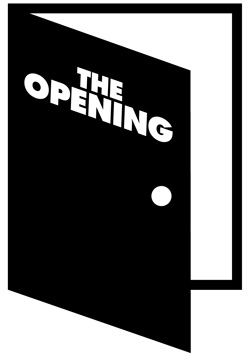 |
|
THE OPENING is all about introducing the fascinating, quirky and wonderful people working in and around the visual arts in Vancouver. Each week, we’ll feature an artist, collective, curator or administrator to delve deep into who and what makes art happen! |
You may have noticed something called the Goethe Satellite popping up around Vancouver during the last half of 2011. As Kate Armstrong and Malcolm Levy explained in my interview with them, the Satellite is a two-year initiative of the Goethe Institut, the German cultural institute whose closest Canadian counterpart would be the Canada Council of the Arts. Kate and Malcolm have been working heavily with local cultural institutions to engage in an international artistic conversation.
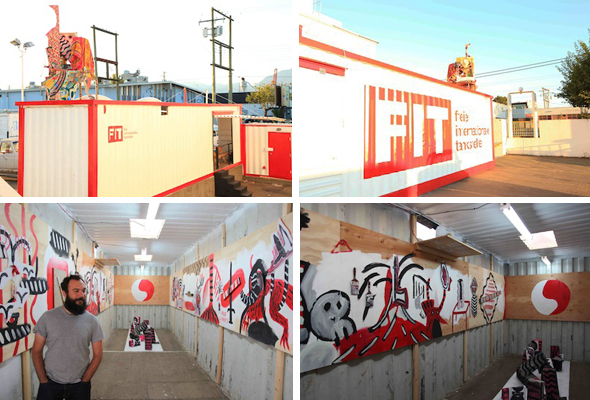
Patrick Cruz 'Maybe Attending' at the FIT, August 2011
Tell me about yourselves.
Kate Armstrong: I'm a writer, curator and an artist. I work on putting together cultural events of various kinds: exhibitions, events, gatherings and publications. I make my own work as well.
Malcolm Levy: I'm an artist and a curator. I work on a lot of different kinds of projects. Mostly video based, some with new media.
I understand you collaborate frequently. Did you collaborate before Goethe [pronounced: Geuh-tah]?
ML: Yes. We've collaborated on projects for almost 10 years together. The first time we actually collaborated was when Kate curated the ArtCamp series, which was an “unconference” that happened at New Forms over three years.
KA: And for the past two years we've been working in a more formal collaborative way with something called Revised Projects. With that we work together on independent curatorial projects putting together exhibitions and events.
How did you get involved with the Goethe Institut?
KA: They had originally approached Malcolm about doing a location study for this city and looking at the lay of the land in Vancouver culturally. We wrote a report with recommendations about how to support the cultural landscape here.
ML: To give context to the Goethe Institut: the way that the Goethe Institut operates internationally is that they have offices, galleries and pop-up spaces in different cities around the world. In Canada they are in Toronto, Montreal and Ottawa. They used to have one in Vancouver, which closed a number of years ago. So for the last number of years there has been no Institut presence in Vancouver. What they were really interested in was seeing what might be possible within a context like that.
KA: They had been supporting cultural events in Vancouver throughout the last decade in various ways, but they wanted to increase their visibility in the community. So what emerged was this idea to make the Goethe Satellite Vancouver. The concept became a mobile space - as opposed to establishing a project space that drew programming into it in a continuous way, it became more about creating a mobile satellite that was working with the existing cultural institutions in the city in order to facilitate new work and new forms of exchange with Germany.
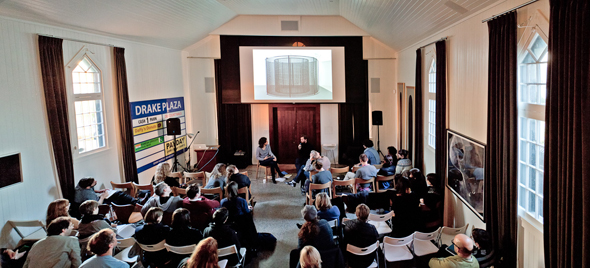
'Intangible Economies' forum at Grey Church in connection with Goethe Satellite@Fillip (Photo: Fillip/Artspeak)
Is everything supposed to be somehow connected to what is going on in Germany as a whole?
ML: To some extent, absolutely. Collaboration with artists in Germany is one of the focuses, but in many different ways. Fillip for instance had a conference in November called 'Intangible Economies' and they invited the artist Olaf Nicolai, who is based in Berlin. He was invited to speak with regard to his practice and the concept of intangible economies. At the same time he is creating a piece for the publication of Fillip related to the conference.
KA: It's a new commission that Fillip asked him to make in connection with the Intangible Economies series. It will get circulated as a printed multiple. It is driven by Antonia Hirsch and Jeff Khonsary. To go back to the question about German culture - the parallel to the Goethe Institut in Canada would be kind of like the Canada Council - they are the German cultural agency. But the way that they work has more to do with facilitating exchange around the world in different places as opposed to funding individual artists or projects with grants. So they have spaces in different places.
ML: Exactly. A number of European countries actually do this. You have national funding agencies that act like the Canada Council. There are agencies like Helvetia in Switzerland, the Mondrian in the Netherlands, or the Goethe Institut, that work around the world in other places. As Kate said it's really about that collaboration and more integration - German artists working with other artists around the world.
But also spreading the culture in places where people might not see it.
ML: Absolutely.
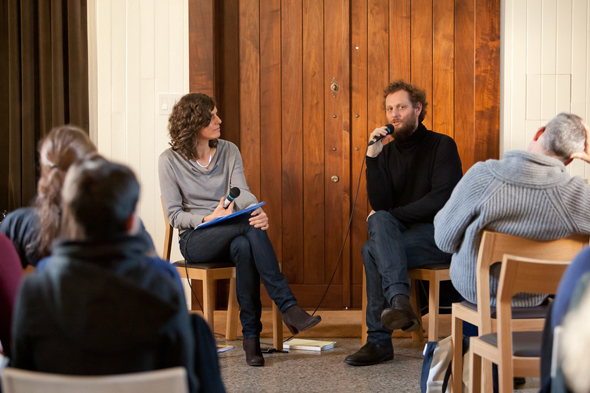
Antonia Hirsch and Olaf Nicolai 'Intangible Economies' forum at Grey Church (Photo: Fillip/Artspeak)
KA: So the conversation has not just been to bring German artists here and plop them into this context, but bringing them here to be in conversation with the community and with the artists here. So most of them are collaborations of some form, have some element of dialogue or exchange in the actual project structure.
Tell me about some of the projects you've done so far, like the first one at the FIT at The Waldorf.
KA: The FIT was a project that started in May 2011 and ran through until the beginning of September. It was a project by Berlin artist Dida Zende. He made a structure from shipping containers, meant as a platform for exchange and for events. It is located at the Waldorf Hotel. It was an exhibition space, a performance space, it operated as a space for gatherings, projections, music, social interaction. So that has become a really interesting part of the Waldorf. It's still there but it was actively programmed through the summer. That was the big kick off for the Goethe Satellite series. After May, the next thing was a call for new projects to be happening in 2011-early 2012 season. A commission by Fillip for Olaf Nicolai began in November with a very nice forum. This series of projects had another great launch with an exhibition at 221A called 'Material Arrangement.' That's curated by Jaz Halloran and Tracey Stefanucci. It involves two Berlin-based artists and two Vancouver-based artists to put on a group exhibition, and to produce a series of print multiples for OCW magazine. The artists are Anette K Hansen, Easton West, Andy Chung and Christy Nyiri.
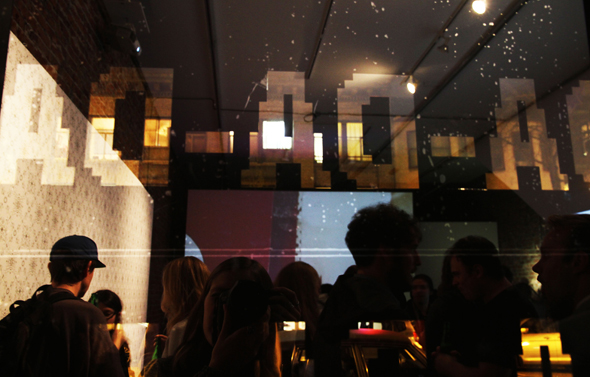
Goethe Satellite @ 221A Artist-Run Centre: 'Material Arrangement' (Photo: Bronte Taylor)
How has the collaboration or conversation between Germany and Vancouver been so far? What have you discovered about Vancouver that you didn't know before or vice versa about Germany?
ML: It's a good question. I think what's really interesting is that it's allowed a number of projects to happen - art installations, initiatives, publications, performances that will be happening - that likely wouldn't happen on the scale that they are otherwise. It's acting as a catalyst for the community. I think that's really important and really interesting to see. Obviously it's always an intention with most cultural projects to see them work within that model of growth or proliferation. But in this case you're really seeing it. The other thing I would say is I'm really taken aback by the diversity of the work that's being shown, with regard to emerging artists, emerging artist-run centres, and established institutions and galleries all playing a role. There's an interesting ecosystem that you see within the different projects. I don't think that we knew what type of projects would be happening and what type of work would be shown.
KA: I think one of the things about it is that Vancouver likes to look away from itself. This series provides a nice frame for that because there is an element of exchange. It develops the community here while allowing travel and cross-pollination to happen. Vancouver loves to look at what's happening in other communities. So it invites that to happen.
ML: That's a really good point. If you look at the history of art and Vancouver artists, there is a history of looking outward as well as within. This gives an interesting opportunity for curators to travel, for artists to travel and for collaboration to happen. I think that's really important and integral.
I’m really curious about your feeling that Vancouver loves to look outside of itself, because a lot of the people I've spoken to in the process of doing this blog feel that Vancouver is very regional and looks inside itself more often than it looks out. So it's interesting to talk to people doing a project that brings people in that you feel like Vancouver looks out. Everybody has these very different opinions of the art community in Vancouver.
KA: The way I connect to that criticism about the regional thing is that historically it's been kind of like "Oh if something is happening elsewhere, then it's better than what we have going on here." Which can be a negative thing if it diminishes a city’s sense of itself. But there are amazing things in the world. You have to look, you should look. What I like about the Goethe Satellite is that it allows that to happen and then for energy to be brought back in conversation with what's happening here.
ML: I would also add that Vancouver's a young city. I actually think it's good that there's a lot of discussion about what's happening in Vancouver and about Vancouver, because that's how an art scene grows. History is constantly being written, and it's really important to do that actively, as opposed to thinking that this process of questioning is a negative thing. It creates an interesting situation for artists and curators and projects in general.
KA: I feel like things are changing all the time in a great way here.
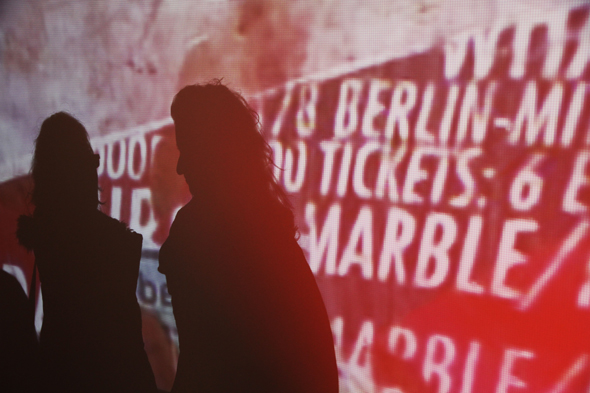
Goethe Satellite @ 221A Artist-Run Centre: 'Material Arrangement' (Photo: Bronte Taylor)
ML: Beyond regionalism, the Vancouver school of photography is known all over the world. So clearly what's being created here is also pushing out and influencing people’s opinions in other places around the world. There is growth that's constantly happening.
What kind of support do you get from Goethe Institut? How are they funding what you are doing here?
ML: Basically they have retained us to work with them on creating this satellite project here in Vancouver, and to work with the community here. They fund the projects. They are incredibly involved, not only on a curatorial level, but to financially support all the projects themselves.
KA: We manage it on a local level. There are five projects that have either begun or ended or have been determined as to what they will be. It's two year initiative overall, with more projects upcoming in 2012.
What's upcoming in 2012?
KA: The next project is launching January 13 at the Or Gallery. It's a solo show by Annika Rixen who is based in Berlin and who actually operates the Or Gallery in Berlin. It is curated by Jonathan Middleton. Then in March there is a very interesting project with Instant Coffee. They are working with a German curator called Bernd Milla. It's a collaborative performance where Milla is going to be selecting a group of artists, and Instant Coffee is going to be selecting a group of composers and musicians. Then they come together in a performance setting for one night and collaborate live. After that we haven't announced anything yet.
ML: The most recent call for proposals is currently being looked at.
Everything you've done so far, did people also propose those projects to you? Or did you source projects through who and what you know?
ML: In terms of the projects themselves, they are all proposed by the community, by different art institutions, artists, curators, etc. We definitely encouraged different groups from the community to apply that we thought would make sense in terms of the Satellite. So it's a combination of the two in a sense.
KA: In some cases we've been facilitating those conversations, but in all the cases the projects are themselves being conceived and operated by the individual curators of the projects.
So the response has been generally good?
KA: It's been great!
ML: I think the response has been great. In terms of the projects themselves, the attendance, the level of the work.
KA: On some level people are just starting to put it together now about how these events fit together in a larger program. As more of the initiatives are launching, we're having the chance to clarify that these different events hang together as a single initiative of the Goethe Institut. Because they are happening in different spaces and with different partners, it has not always been immediately obvious to people that they are connected as an initiative.
ML: What's happening now with the inaugural events having occurred and with information out there about the projects, people are really starting to get it now. The best way to explain anything is by showing it, to tell that story and to tell that narrative. It's really interesting to see that play out and what's actually been created.
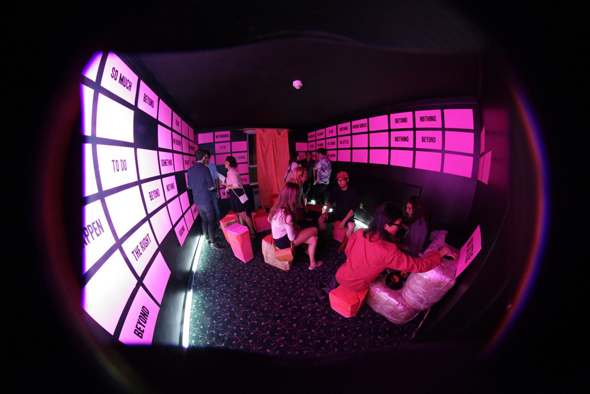
Instant Coffee 'When We Are Bored We Reserve the Right to Do Nothing' New Forms Festival 2011
So you have found it a bit of a challenge to get people to understand what you've been doing?
ML: Not so much a challenge, but...
KA: It's just about establishing an identity for the Goethe Satellite Vancouver. People see the individual projects, and what we want them to also see is the series.
ML: The whole. All of this is telling an interesting narrative about the Vancouver art scene as a whole. You have very different projects, all happening under one banner.
KA: It also brings all of this nice work from Vancouver to Europe in a different way. That's really part of what it is meant for, the programming. The temptation is to see this conversation from the perspective of Vancouver, but there's also the other aspect of how these artists and the work that's being produced here is being communicated in Germany and in Europe through those channels.
What do you want to achieve with the Goethe Satellite project?
ML: Going back all the way back to the beginning, the initial aims were to see how the Institut could work in Vancouver. For us it was really about seeing how we could take an alternative form of funding and support the community, to be part of a new catalyst. It was important to look at how that could happen, for any community but especially here. Seeing that happen has been amazing. The goal that comes out of that is seeing a number of projects happen that wouldn't happen otherwise, artistically on a level that is international, and that helps add to an overall conversation.
KA: It's just fun when things happen in this city. It's been another way that we've been able to work as independent curators to help make things happen here.
--------
For more information on Goethe Satellite Vancouver, visit their
website.
Images courtesy Goethe Satellite Vancouver, unless otherwise noted.









